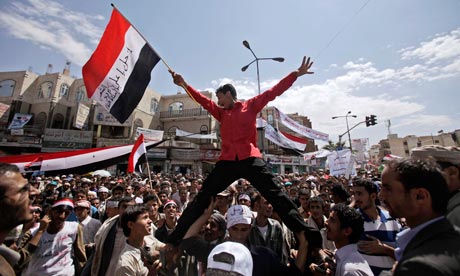By clinging to power Saleh is putting the stability and security of the region at risk-and the West must tell him so.
By Khalid al-Hureibi
This commentary was published in The Guardian on 10/03/2011

President Ali Abdullah Saleh is rapidly losing control in Yemen. Populist unrest is escalating despite a heavy-handed approach by the government. Last week, in a show of solidarity, the Hashed and the Bakeel – the two largest tribal groups in Yemen, and allies of Saleh over many years – announced their full support for youthful protesters demanding a change of regime.
Saleh has offered unprecedented concessions to the opposition. He retracted his plan for constitutional amendments that would have allowed him to stay in power indefinitely and proposed to form a government of unity. The Joint Meeting Parties (JMP), the largest Yemeni opposition bloc, categorically rejected the offers and asked for his immediate departure. Some sources say Saleh even offered to let the opposition form a government on its own terms.
The president has lost credibility on the street and across the whole Yemeni political spectrum but western countries, led by the US, have not shown they appreciate the risks in retaining the status quo in Yemen. The longer the current situation continues, the more resentment will grow against the regime and the sooner a civil war will become imminent. This will not only affect Yemen but the repercussions would certainly affect the region and the security of the world at large.
In such circumstances, external military intervention would eventually be inevitable. The spectre of such a situation could dwarf current happenings in Afghanistan – not only because of the tribal structure of Yemeni society, but also because of the ready availability of weapons. Yemen is second only to the US in guns per capita (60 guns per 100 people, according to the Small Arms Survey in 2007).
Saleh once infamously described his efforts to rule the tribes of Yemen as like "dancing on the heads of snakes". It seems his days of being a good dancer are over and the snakes have transformed into dragons that will not only devour him but possibly the whole country and the region as well.
Saleh has received more than $300m from the US to fight terrorism but several WikiLeaks cables show the Americans are disappointed with his efforts.
The Yemeni government is directing all its security and military capabilities to control widespread uprisings and this has provided al-Qaida with the unstable environment it craves in order to escalate its activities in the Arabian peninsula. The situation will worsen if a civil war breaks out in Yemen and a power vacuum ensues.
The Houthis – the insurgent Shia group operating in north Yemen – are in total control of two provinces and their power is progressively increasing due to the weak central government. The Houthis will certainly take advantage of any turmoil and Iran would, quite possibly, support them.
The separatists in the south are growing stronger every day. Saleh's regime has denied them basic political rights and treated them as second-class citizens when allocating resources and land. Despite the use of excessive force and killings to crack down on dissent in the south, the numbers of protesters have been increasing. This instability has allowed al-Qaida to place its main strongholds on the Arabian peninsula in the south of Yemen.Recent events in Egypt and Tunisia have shown it is not in the west's interest to adopt a "wait and see" policy until one side wins and only then lend support. The people in the region resent this opportunism, which severely undermines the credibility of western governments. This approach provides the radical anti-western discourse a golden opportunity to attract followers.
If Yemen descends into chaos, and this is a very real possibility, the anti-west resentment will grow exponentially if external military intervention becomes a necessity.
For any solution to be successful it should consider an honourable exit for Saleh and a smooth transition of power. The west needs to make it clear that Saleh should leave now. Pressure must be applied for a handover of power in a smooth and orderly fashion under international supervision.
Aspects needing urgent attention are:
• Forming a presidential council to rule for an interim transitional period. This council should include representatives from the JMP, the army and the protesters.
• Holding fair and free presidential and parliamentary elections within one year, monitored by regional and international observers.
• Guarantees that Saleh, or any of his family, will not be brought to trial, provided they relinquish all their government posts and return all money or gains made when in power.
• The assets of Saleh and his family inside the country and abroad should be frozen.
• An arms embargo should be enforced.
• The army should commit to a neutral status in any political conflict.
Without such urgent and proactive action, the situation will descend further into mayhem. The west should realise that Saleh has become so detrimental to the stability and security of the region and his clinging to power will prove to be very costly over the next few weeks.
No comments:
Post a Comment